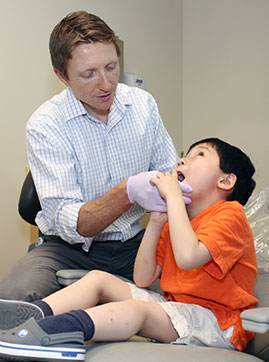The University of Washington’s Department of Pediatric Dentistry has been awarded a $2.25 million federal grant for an ambitious training program to significantly broaden access to dental care for Washington children with special health care needs.

Dr. Travis Nelson, acting chair of the School of Dentistry department, will lead the five-year Health Resources and Services Administration grant, which will fund the creation of an Interdisciplinary Special Needs Access Network (I-SPAN). Key elements of the program include:
- Enhanced training for pediatric dental residents in caring for children with special health-care needs and other underserved populations.
- Development of a postgraduate interdisciplinary training center drawing on the expertise of dental and medical providers at Seattle Children’s Hospital and the UW’s Leadership Education in Neurodevelopmental and Related Disabilities (LEND) clinic. Other partners include the School of Dentistry’s DECOD special-needs dental clinic and training program, residents in the state’s Advanced Education General Dentistry program, and other UW dental specialty programs.
- Use of telehealth technology to allow remote dental screenings and wider access to specialized care for children in rural and underserved areas.
Faculty and residents involved in I-SPAN will also provide training in the care of the targeted children to dentists in the state’s Access to Baby and Child Dentistry (ABCD) network. ABCD was launched in the mid-1990s to improve low-income children’s access to dental care. In the past 20 years the program has produced dramatic oral health improvements for Washington children.
“The prevalence of children with developmental and/or intellectual disability, ADHD, and autism has increased significantly over the last decade,” Dr. Nelson wrote in his grant proposal. “Today, roughly one in six children has special health care needs. Dental care for children in poverty, especially in rural areas, is routinely reported as the greatest unmet health care need in this population, with an estimated 10 to 20 percent of children with special needs unable to obtain this care.”
Dr. Nelson indicated that the problem is aggravated by the lower numbers of dentists, especially specialists, in rural areas, and the fact that rural residents are less likely to have dental insurance. He noted that children with special health-care needs are also more likely to have problems such as teeth-grinding, overgrown gum tissue, developmental tooth defects, and jaw disorders.
“We are absolutely thrilled to have received this funding,” he said. “It will support training to better equip dental providers to care for these incredibly deserving patients. We will see immediate local effects in enhanced training for UW residents. As the network develops, access to care will improve throughout our state as existing providers receive training, through teledentistry, and when residents graduate and take the skills into practice.”
Planning and organization is expected to take up the first year of the grant, with implementation to follow in years two through five.
The Department of Pediatric Dentistry, through its Center for Pediatric Dentistry clinic in Seattle’s Sand Point neighborhood, has already won recognition for its extensive care for children with special needs. This includes a clinic for children with autism, which Dr. Nelson established in 2012 and has since had exceptional success in providing dental care to these children.